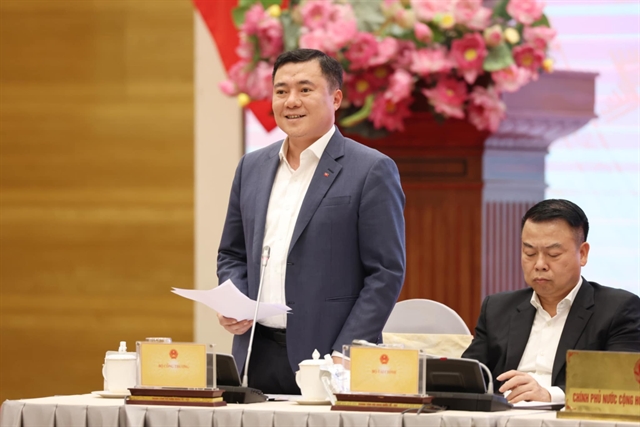 |
| Deputy Minister of Industry and Trade Nguyễn Sinh Nhật Tân at the regular Government press briefing held on Saturday. — Photo baochinhphu.vn |
HÀ NỘI — Việt Nam's very first nuclear power project, set in the south-central coastal province of Ninh Thuận, is expected to cost billions of dollars but will bring significant benefits for the country.
Deputy Minister of Industry and Trade, Nguyễn Sinh Nhật Tân, made the announcement at the regular Government press briefing held last weekend.
Tân said that the overall investment for the project depended on various factors.
"Currently, we have a preliminary estimate, though it is not yet precise, but it will certainly reach billions of dollars. The final figure will depend on the scale, location, technology requirements and even safety considerations," he said.
Regarding the primary benefits, he outlined three key advantages of the project.
Firstly, the development of nuclear power would provide a stable, clean energy foundation that aligned with global trends towards green and renewable energy.
Without a reliable base energy source, balancing electricity supply would be perilous.
By developing nuclear power alongside other green, clean energy sources, the country would improve energy security while meeting dual environmental and energy needs.
Secondly, nuclear power would serve not only the local development of Ninh Thuận Province but also neighbouring regions and the entire country.
“In the future, as renewable and clean energy sources grow, there is potential for export opportunities as well,” he said.
The project would foster the development of high-tech industries, particularly in atomic energy science, which was foundational and would continue to evolve.
That would drive the growth of a new industry and a highly skilled workforce, contributing significantly to national development.
On November 30, the National Assembly passed a resolution endorsing the continuation of the Ninh Thuận nuclear power project and approved further studies into nuclear power development.
The Ministry of Industry and Trade had already conducted research and reported its findings to the Government and relevant authorities.
The project has received approval from Government and has been confirmed by the National Assembly.
The next steps involve deciding how to implement the project.
The Government had tasked the relevant ministries, with the Ministry of Industry and Trade, taking the lead on research and reporting back to the Government.
But first, it needed to complete the legal framework related to nuclear power.
Fortunately, a major achievement was that the National Assembly passed the revised Electricity Law, which included provisions for nuclear power development.
Additionally, the Government was expected to report to the National Assembly regarding amendments to the Law on Atomic Energy.
The legislation would address essential issues, including technology standards and safety regulations, providing a legal foundation for the project.
In addition, the ministry had advised the Government and the Prime Minister to establish a steering committee for the nuclear power plant's construction and a working group to restart the nuclear power programme in Việt Nam.
The committee would be headed by the Prime Minister, with a Deputy Prime Minister serving as vice-chair.
The committee could include relevant ministers, while the working group would consist of representatives from various sectors, as well as nuclear energy experts and scientists. The working group would be led by the Minister of Industry and Trade.
Moreover, the ministry would soon propose amendments to the 8th National Power Development Plan to reflect the National Assembly's stance and to establish a solid legal framework for the project.
The ministry would also recommend selecting an investor for the nuclear plant, a crucial step as the investor would be responsible for all stages of the project, from research and proposal to construction and operation.
An important aspect of the project’s progress involves local cooperation.
The ministry had urged the local administration of Ninh Thuận Province to expedite the provision of clean land and foster local public support to ensure the smooth implementation of the nuclear power project.
Regarding the project's outlook, he noted that there was already significant consensus and support for the initiative, which was a major advantage.
“Although the project was previously paused for various reasons, it is now set to move forward with a solid foundation, having already undergone considerable preparatory work,” he said.
However, there were challenges ahead, particularly regarding the selection of technology, ensuring safety and preventing potential incidents.
International recommendations, especially from global atomic energy agencies, also played a crucial role in ensuring the project met international standards.
"We are confident that, step by step, we will proceed cautiously and safely with the project. The technology available today is highly advanced, with many new technologies that offer increasingly high safety standards," he said.— VNS


